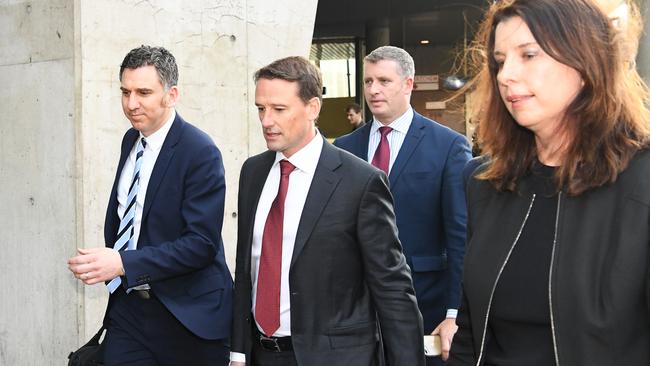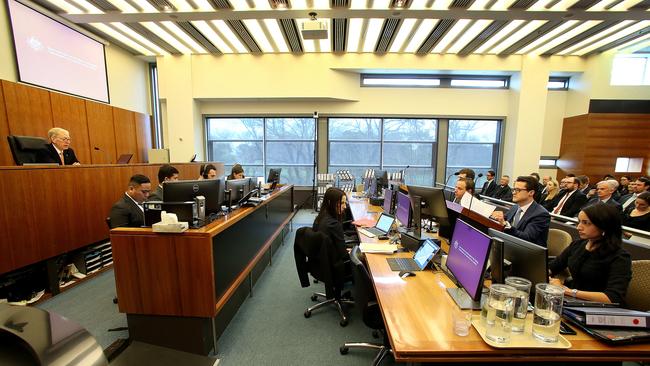Banking royal commission: NAB feared exodus of super clients
NATIONAL Australia Bank feared it would suffer an exodus of superannuation customers if it axed commissions for financial advisers, the banking royal commission has heard.
Business
Don't miss out on the headlines from Business. Followed categories will be added to My News.
NATIONAL Australia Bank feared it would suffer an exodus of superannuation customers if it axed lucrative commissions for financial advisers who steered clients in the lender’s direction.
And executives felt they had “an entitlement” to charge fees to super customers for providing financial advisers — even if those customers weren’t actually provided with advisers — because a call centre and online tools were available, the banking royal commission has heard.
READ MORE: SUPER IN SPOTLIGHT AT ROYAL COMMISSION
BIG BANKS’ GLUTTONY PANNED IN DAMNING REPORT
The revelations came as the fifth round of hearings, this time focusing on the $2.6 trillion super industry, got underway at the Federal Court in Melbourne today.
Counsel assisting the commission Michael Hodge, QC, examined why NAB continued to hit super customers with commissions payable in old funds as they were rolled into a new fund.

Through its MLC wealth management division, NAB in July 2016 formed the nation’s biggest retail super fund — the $76 billion MLC Super Fund — by merging five other funds.
Former NAB wealth products head Paul Carter, who ran various NAB wealth operations between 2013 and 2017, said the bank feared that if commissions were axed, it would lose customers and profit.
“The logic was that if commissions were ceased to financial advisers, then they would likely take those clients to different providers,” he told the commission.
Mr Hodge said there “would be dissatisfaction with (that) group, notwithstanding they would perceive that someone is breaching a contract”.
The concern was that the financial advisers would “likely move their customers to a different fund, or that (was) a possibility … and that would then have subsequent impacts on the sustainability of the fund by virtue of the fact that the assets had fallen”, he said.

Mr Carter is now chief customer officer for consumer and wealth at NAB’s New Zealand operation, BNZ.
He also told the commission some NAB executives “felt an entitlement” to continue charging fees for providing financial advisers to super customers, even if those customers didn’t actually have advisers.
Management made a mistake in thinking it could charge those fees, Mr Carter said.
Internal NAB documents were tabled at the commission that showed 220,000 members had been incorrectly charged $35 million.
Those customers were paid back two years ago, with each receiving about $160.
Two weeks ago, NAB said it would pay an extra $67 million to customers who paid fees — that they didn’t know they could opt out of — for general financial advice.
It came to light today that the bank was paying out a further $20 million to the same customers for lost investment earnings.

Mr Hodge also questioned the definition of some payments to financial advisers as “commissions” rather than as “advice fees”.
If payments were defined as commissions, they did not have to be repaid if no service was ultimately provided, the inquiry heard.
Advice fees, by contrast, could be refundable if no service were provided.
Responding, Mr Carter said services could still be provided “under a commission arrangement”.
He later agreed the wording in documents explaining fees “could have been enhanced”.
Mr Hodge revealed the commission had been flooded with submissions from Australians hit with superannuation fees for advice and insurance they didn’t ask for.
In his opening statement, he said there was evidence consumers often had insufficient financial literacy to understand their super documentation.
As a result, many would struggle to keep track of the performance of their retirement savings, Mr Hodge said.

There was some confusion between the main regulators, the Australian Securities and Investments Commission and the Australian Prudential Regulation Authority, in their attempts to co-operate as they supervised the industry, he said.
Turning to super trustees in his opening statement, Mr Hodge asked what happened when they were tempted to do the wrong thing.
“What happens when we leave these trustees alone in the dark with our money,” he asked.
“Can they be trusted? If they can’t, what must be done to protect Australian’s retirement savings?”


